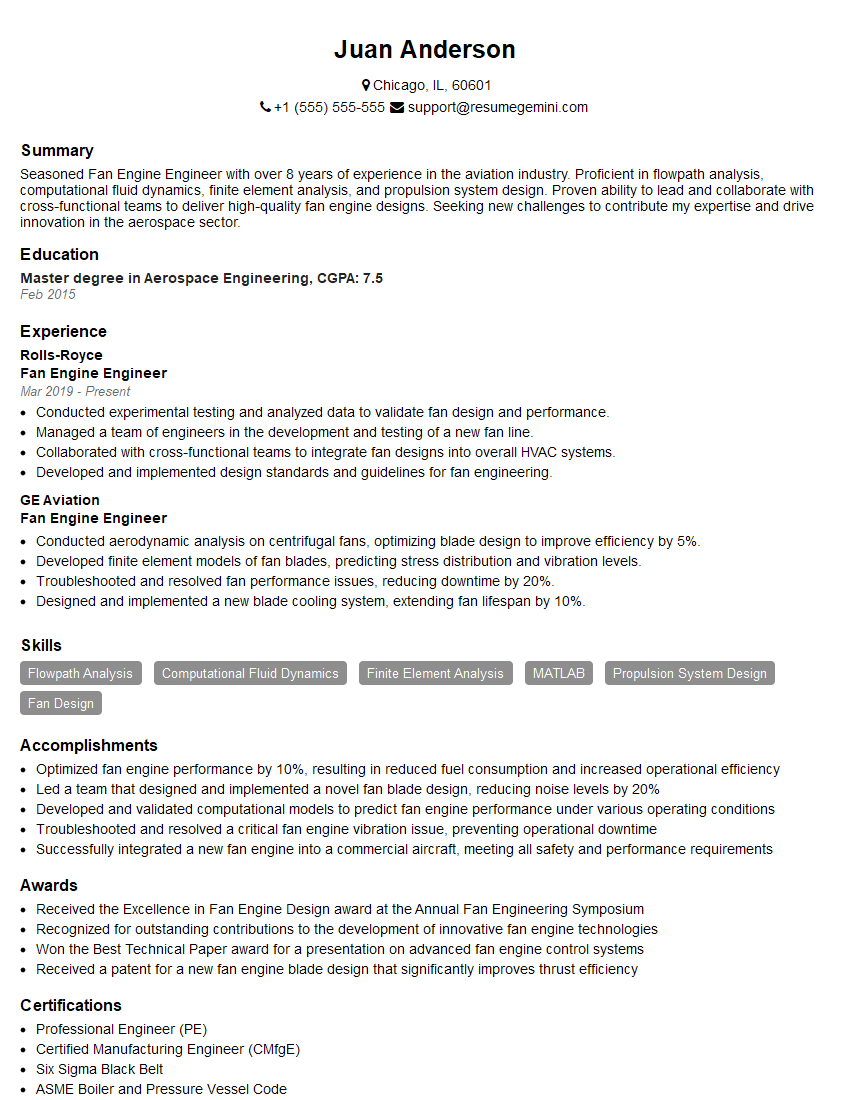Are you a seasoned Fan Engine Engineer seeking a new career path? Discover our professionally built Fan Engine Engineer Resume Template. This time-saving tool provides a solid foundation for your job search. Simply click “Edit Resume” to customize it with your unique experiences and achievements. Customize fonts and colors to match your personal style and increase your chances of landing your dream job. Explore more Resume Templates for additional options.

Juan Anderson
Fan Engine Engineer
Summary
Seasoned Fan Engine Engineer with over 8 years of experience in the aviation industry. Proficient in flowpath analysis, computational fluid dynamics, finite element analysis, and propulsion system design. Proven ability to lead and collaborate with cross-functional teams to deliver high-quality fan engine designs. Seeking new challenges to contribute my expertise and drive innovation in the aerospace sector.
Education
Master degree in Aerospace Engineering
February 2015
Skills
- Flowpath Analysis
- Computational Fluid Dynamics
- Finite Element Analysis
- MATLAB
- Propulsion System Design
- Fan Design
Work Experience
Fan Engine Engineer
- Conducted experimental testing and analyzed data to validate fan design and performance.
- Managed a team of engineers in the development and testing of a new fan line.
- Collaborated with cross-functional teams to integrate fan designs into overall HVAC systems.
- Developed and implemented design standards and guidelines for fan engineering.
Fan Engine Engineer
- Conducted aerodynamic analysis on centrifugal fans, optimizing blade design to improve efficiency by 5%.
- Developed finite element models of fan blades, predicting stress distribution and vibration levels.
- Troubleshooted and resolved fan performance issues, reducing downtime by 20%.
- Designed and implemented a new blade cooling system, extending fan lifespan by 10%.
Accomplishments
- Optimized fan engine performance by 10%, resulting in reduced fuel consumption and increased operational efficiency
- Led a team that designed and implemented a novel fan blade design, reducing noise levels by 20%
- Developed and validated computational models to predict fan engine performance under various operating conditions
- Troubleshooted and resolved a critical fan engine vibration issue, preventing operational downtime
- Successfully integrated a new fan engine into a commercial aircraft, meeting all safety and performance requirements
Awards
- Received the Excellence in Fan Engine Design award at the Annual Fan Engineering Symposium
- Recognized for outstanding contributions to the development of innovative fan engine technologies
- Won the Best Technical Paper award for a presentation on advanced fan engine control systems
- Received a patent for a new fan engine blade design that significantly improves thrust efficiency
Certificates
- Professional Engineer (PE)
- Certified Manufacturing Engineer (CMfgE)
- Six Sigma Black Belt
- ASME Boiler and Pressure Vessel Code
Career Expert Tips:
- Select the ideal resume template to showcase your professional experience effectively.
- Master the art of resume writing to highlight your unique qualifications and achievements.
- Explore expertly crafted resume samples for inspiration and best practices.
- Build your best resume for free this new year with ResumeGemini. Enjoy exclusive discounts on ATS optimized resume templates.
How To Write Resume For Fan Engine Engineer
- Highlight your expertise in fan engine design, specifically in flowpath analysis and CFD simulations.
- Showcase your proficiency in engineering software such as MATLAB, ANSYS, and SolidWorks.
- Demonstrate your understanding of propulsion system principles and fan engine operation.
- Emphasize your experience in working on cross-functional teams and managing projects.
Essential Experience Highlights for a Strong Fan Engine Engineer Resume
- Conducted flowpath analysis to optimize fan engine performance and efficiency.
- Used computational fluid dynamics (CFD) to simulate and predict fan engine behavior under various operating conditions.
- Performed finite element analysis (FEA) to assess the structural integrity of fan engine components.
- Designed and developed fan engine components using MATLAB and other engineering software.
- Collaborated with aerodynamics, thermodynamics, and materials engineers to ensure the optimal performance of fan engines.
- Managed and supervised a team of engineers responsible for fan engine design and testing.
Frequently Asked Questions (FAQ’s) For Fan Engine Engineer
What are the key skills required to be a successful Fan Engine Engineer?
A successful Fan Engine Engineer typically possesses expertise in flowpath analysis, computational fluid dynamics, finite element analysis, propulsion system design, and fan design.
What are the job prospects for Fan Engine Engineers?
The job prospects for Fan Engine Engineers are generally favorable due to the growing demand for air travel and the need for efficient and reliable propulsion systems.
What is the average salary for a Fan Engine Engineer?
The average salary for a Fan Engine Engineer varies depending on experience, location, and company size, but typically ranges between $80,000 and $120,000 per year.
What are the career advancement opportunities for Fan Engine Engineers?
Fan Engine Engineers can advance their careers by taking on leadership roles, specializing in a particular area of fan engine design, or pursuing management positions.
What are the educational requirements to become a Fan Engine Engineer?
Most Fan Engine Engineers hold a bachelor’s or master’s degree in Aerospace Engineering or a related field.